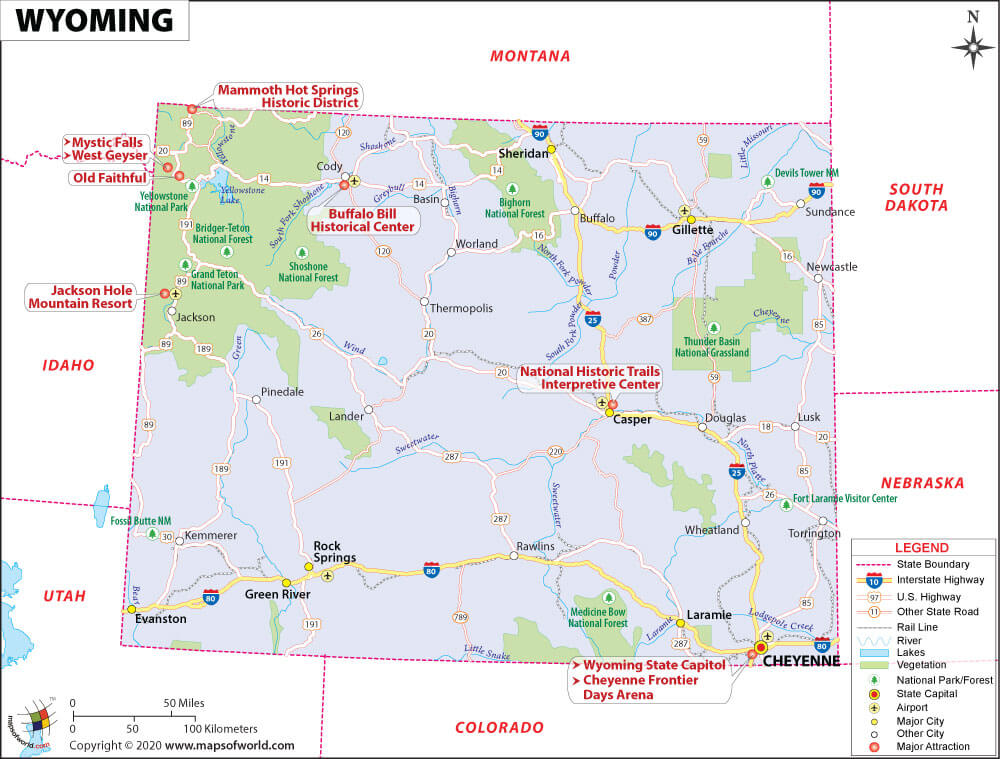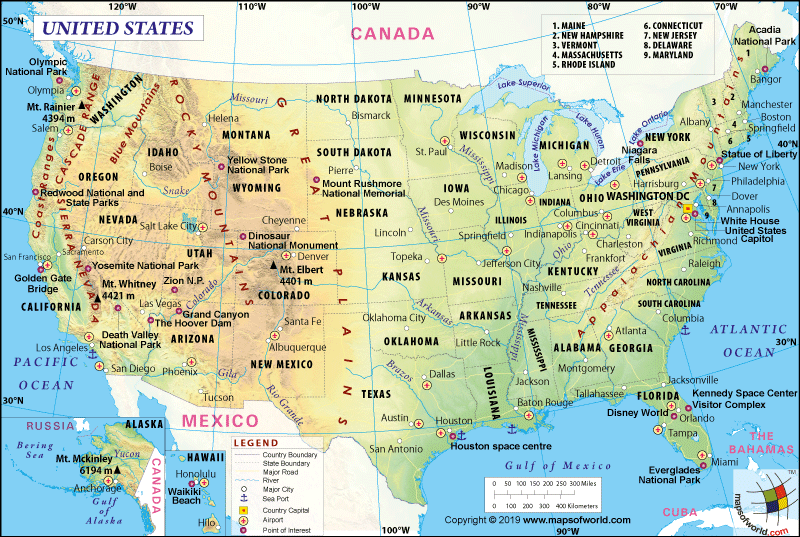What are the Key Facts of Wyoming?

|
State |
Wyoming |
|
State Capital |
Cheyenne |
|
Largest City |
Cheyenne |
|
Coordinates |
43°N 107.5°W |
|
Nickname(s) |
“Equality State” (official); “Cowboy State”; “Big Wyoming” |
|
Postal Abbreviation |
WY |
|
Area |
97,914 sq. mi (253,600 sq. km) |
|
Highest Point |
Gannett Peak, 13,809 ft (4,209.1 m) |
|
Neighboring States |
Montana, Colorado, Idaho, Nebraska, South Dakota, Utah |
|
Number of Counties |
23 |
|
Population |
578,759 (2019) |
|
Date of Entering the Union |
July 10, 1890 |
|
State Anthem |
“Wyoming” |
|
Governor |
Mark Gordon (Republican) |
|
Secretary of State |
Edward Buchanan (Republican) |
|
U.S. senators |
Mike Enzi (Republican), John Barrasso (Republican) |
|
U.S. House Delegation |
Liz Cheney (Republican), Mike Enzi (Republican), John Barrasso (Republican) |
|
GDP (millions of dollars) |
39,794 |
|
Demonym |
Wyomingite |
|
Time Zones |
UTC−07:00 (Mountain), Summer (DST) UTC−06:00 (MDT) |
Where is Wyoming?
Wyoming is in the western part of the United States of America. It is a landlocked state and shares its borders with Montana to the north and northwest, South Dakota, and Nebraska to the east. Colorado surrounds it to the south, Utah to the southwest and Idaho to the west. The capital of the state is Cheyenne, which lies in the southeastern region of the state. It is the 44th state admitted to the union of the United States of America on July 10, 1890, and is the second least populated state of the USA.
What is the Geography of Wyoming?
Wyoming spreads across a total area of 97,914 sq. mi (253,600 sq. km), out of which 97,093.14 sq. mi ( 251,470 sq. km) is land area while water covers 719.87 sq. mi (1,864 sq. km). Water bodies constitute 0.74% % of the total area. It ranks 10th in terms of the total area in the US.
There is no shortage of rivers in Wyoming. Several magnificent rivers are flowing throughout the state like Snake River, Green River, Laramie River, Sweetwater River, and so on. However, the Snake River is the longest in the state. It is 1,078 miles (1,735 km) long and considered as the largest tributary of the Columbia River.
The state’s mean elevation is 6,700 ft (2,040 m) above sea level. The highest elevation point of Wyoming is Gannett Peak, which is 13,809 ft (4,209.1 m), while its lowest point of elevation is Belle Fourche River in the South Dakota, which is 3,101 ft (945 m).
Wyoming is replete with various incredible mountains such as- the Absaroka Range, Beartooth Mountains, Wind River Peak, and many more. At the same time, Gannett Peak is the highest mountain peak in the state.
Wyoming is divided into several physiographic regions which are the Black Hills; the Great Plains; the Southern, Middle, and Northern Rocky Mountains; and the Wyoming Basin. The Black Hills area of Wyoming has several incredible parks and monuments.
The state contains eight national forests and the name of some of the major state forests are Ashley National Forest, Bighorn National Forest, Black Hills National Forest, and Bridger-Teton National Forest.
It is home to several rare species such as bison, mountain lions, wolverines, bobcats, grizzly bears, black bears, elk, moose, and Gray wolf. Wyoming is also home for several kinds of birds like Eastern meadowlark, Brewer’s blackbird, Red-winged blackbird, and Bobolink.
The state tree of Wyoming is the Populus sect. Aigeiros, while Wyoming Indian paintbrush, is the state’s flower. Also, the state has declared the bison as the official state animal, and Western meadowlark is the state bird of Wyoming.
What is the Climate of Wyoming?
Wyoming generally has a semi-arid and continental type of climate. The state experiences warm and moderate wet summers, but winters are cold.
The summers of the state remain warm with the average temperature remaining around 75°F (23.9°C) to 90°F (32.2°C). However, the temperature in the peak of July of the highlands, above 2500 meters experiences 70°F (21.1°C) to 75°F (23.9°C). While the night is pleasant in summer, the average temperature remains between 50°F (10°C) to 60°F (15.6°C).
The average low temperature in the shivering cold in January remains between 0°F (-17.8°C) to 18°F (-7.8°C). Wyoming’s eastern and southern areas are warmer than the rest of the state. Therefore the average temperature in winter of Buffalo city remains between 14°F (-10°C) to 36°F (2.2°C), while the capital of the state Cheyenne experiences a cold range of 18°F (-7.8°C) to 40°F (4.4°C). January and July are the coldest and hottest months in the state, respectively.
Rainfall occurs in the state during late spring and early summer. It is somewhat of a dry state, so average rainfall occurs around 10 inches (254mm). The lowland of Wyoming receives scanty rainfall in the range of 8 inches (203.2mm) to 10 inches (254mm), but the higher altitude gets an average rainfall of around 15 inches (381mm) to 20 inches (508mm). Snowfall in the mountain ranges touches up to 200 inches (5100mm).
What is the Economy of Wyoming?
Livestock plays a key role in Wyoming’s economy and generates the bulk of revenue for the state. The state’s major livestock products are beef cattle and calves, sheep, and lambs. Besides these, the state is also known for the production of sugar beets, barley, dry beans, oats, sunflowers, and wheat. It is also a significant producer of sheep and wool. Wyoming is famous for the production of chicken eggs.
The state doesn’t play any prominent role in the manufacturing industry. Somewhat, metal containers, structural metal works, etc. also take place in Wyoming.
In the mining sector, Wyoming is famous as the leading coal-producing state along with the production of petroleum and natural gas. It is also a major producer of bentonite and other clays.
Tourism is a major source of income in the state. As per the report in 2019, overall, 9.2 million people visited Wyoming. The local and overseas tourists spent $3.95 billion in the state. The tourism industry has provided jobs to a large number of people.
The total Gross Domestic Product (GDP) of the state was $39,646.2 in 2019, while the per capita personal income in Wyoming was 63,316 US dollars in 2019.
What is the Transportation System of Wyoming?
The state has no train service, scrapped in 1997 due to high costs. Although, Wyoming’s Greyhound bus network covers most parts of the major cities in the state. Interstate bus services are available for reaching major towns. However, to reach remote villages, a car is the best option.
The Wyoming Department of Transportation maintains the interstate highways in Wyoming. Prominent mainline highways of the state are 1-25, 1-80, 1-90, 1-180. Some of the famous business routes are 1-25 Bus, 1-80 Bus 1-90 Bus, and so on.
The airline network well connects Wyoming. The state is replete with various incredible airports – Casper/Natrona County International Airport, Yellowstone Regional Airport, Afton Municipal Airport, Converse County Airport, and many more.
What is the Origin of the Name of “Wyoming”?
“Wyoming” gets its name from a green valley. The name “Wyoming” is a contraction of the Native American word “mecheweamiing” (at the big plains). The first time the term was used by the Delaware people for the Wyoming Valley in northeastern Pennsylvania.
As per the other source, the name “Wyoming” comes from an Algonquin Indian word meaning “large prairie place”.
Why is Wyoming Called “The Equality State”?
The official state nickname of Wyoming is “The Equality State”. The word equality is used because it was the first state which allowed women to vote in 1869. The state empowered women to vote to fulfil the population requirement for statehood. The state is also known as “Big Wyoming” and “Cowboy State”.
What are the Popular Tourist Attractions in Wyoming?
Wyoming is a remarkable place for tourists. The visitors can enjoy the rugged landscapes, rich tribal legend, rodeos, ranches, and cowboy towns. The world’s great wilderness areas are a treat to watch.
The state is packed with several beautiful tourist attractions such as Yellowstone National Park, Grand Teton National Park, Jackson, Flaming Gorge National Recreation Area, The Wind River Range, and many more. Wyoming is a place where tourists can enjoy a lot.
Facts About Wyoming
- In USA Wyoming is surrounded by the highest amount of states.
- When people get into Wyoming they are provided with mugs on a complimentary basis.
- The earliest indigenous tribes to have resided in Wyoming are Cheyenne, Sioux, Crow, Ute and Shoshone.
- Most of the Yellowstone National Park is in Wyoming but a few smaller parts are spread across Montana and Idaho. It is the earliest national park of USA and became so in 1872 when it was accorded the said status.
- Wyoming was sold to USA by France by way of the Louisiana Purchase that was enacted in 1803. The earliest Caucasian to have gone into the area a fur trapper named John Colter. It was he who made the world aware of the hot springs and geysers that were abundant in the Yellowstone area after going around the region in 1807.
- Nellie Tayloe Ross was the earliest woman to govern a state in USA. She rose to the said position in Wyoming in 1925.
- There is a word spoken by the Delaware tribe that means a land filled with huge plains. This term is the source of the Wyoming’s name.
- One of the several nicknames of Wyoming is Equality State.
- Wyoming organizes the Yellowstone Jazz Festival.
- Indian paintbrush is Wyoming’s officially recognized flower.
- Cookie cutters that are shaped like states are a huge hit in USA. Buyers prefer Wyoming the most after West Virginia that leads the popularity stakes.
- One of the names that were originally thought for Wyoming was West Dakota.
- Oregon Trail stretches across the state. Robert Stuart is credited for having founded the same in 1812-13. The earliest everlasting trading set up of the state was established in 1834 – it was named Fort Laramie. As per the Oregon Treaty that was signed in 1846 between UK and USA the latter got control of the state’s western part. The Mexican War also reached its conclusion in 1848 thanks to the said agreement.
- Yellowstone National Park has the maximum number of geysers among fields that possess such geographic features.
- Women in Wyoming were the earliest in USA to have received suffrage rights. This happened after it was organized at a territorial level in 1869.
- Globally this state has the biggest reserves of sodium carbonate.
- Wyoming has a largely rural form of residential pattern – there are many small towns that farming and ranching opportunities, mining colonies and communities that enable residents to take part in recreational and outdoor activities.
- The aggregate area of Wyoming is 97,813 square miles.
- Cheyenne Christmas is staged in Wyoming.
- Triceratops is the officially approved dinosaur of the state.



